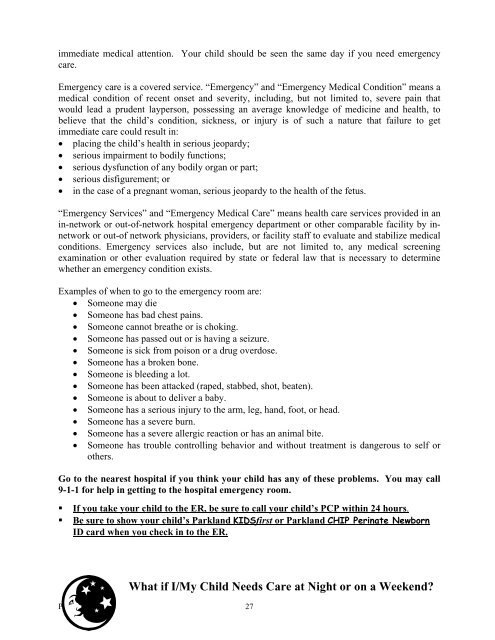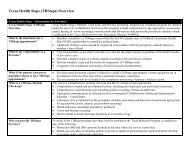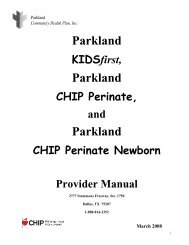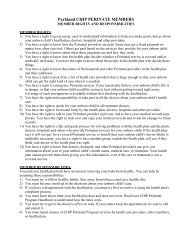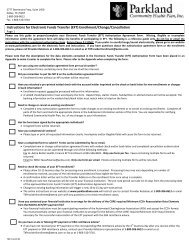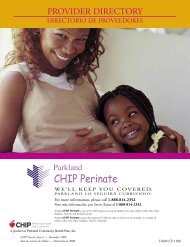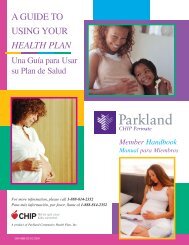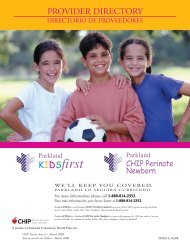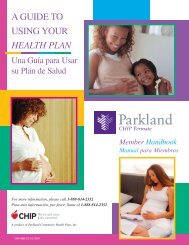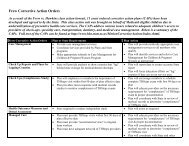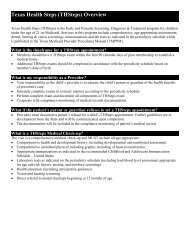Member Handbook for Parkland KIDSfirst and Parkland CHIP ...
Member Handbook for Parkland KIDSfirst and Parkland CHIP ...
Member Handbook for Parkland KIDSfirst and Parkland CHIP ...
Create successful ePaper yourself
Turn your PDF publications into a flip-book with our unique Google optimized e-Paper software.
immediate medical attention. Your child should be seen the same day if you need emergency<br />
care.<br />
Emergency care is a covered service. “Emergency” <strong>and</strong> “Emergency Medical Condition” means a<br />
medical condition of recent onset <strong>and</strong> severity, including, but not limited to, severe pain that<br />
would lead a prudent layperson, possessing an average knowledge of medicine <strong>and</strong> health, to<br />
believe that the child’s condition, sickness, or injury is of such a nature that failure to get<br />
immediate care could result in:<br />
• placing the child’s health in serious jeopardy;<br />
• serious impairment to bodily functions;<br />
• serious dysfunction of any bodily organ or part;<br />
• serious disfigurement; or<br />
• in the case of a pregnant woman, serious jeopardy to the health of the fetus.<br />
“Emergency Services” <strong>and</strong> “Emergency Medical Care” means health care services provided in an<br />
in-network or out-of-network hospital emergency department or other comparable facility by innetwork<br />
or out-of network physicians, providers, or facility staff to evaluate <strong>and</strong> stabilize medical<br />
conditions. Emergency services also include, but are not limited to, any medical screening<br />
examination or other evaluation required by state or federal law that is necessary to determine<br />
whether an emergency condition exists.<br />
Examples of when to go to the emergency room are:<br />
• Someone may die<br />
• Someone has bad chest pains.<br />
• Someone cannot breathe or is choking.<br />
• Someone has passed out or is having a seizure.<br />
• Someone is sick from poison or a drug overdose.<br />
• Someone has a broken bone.<br />
• Someone is bleeding a lot.<br />
• Someone has been attacked (raped, stabbed, shot, beaten).<br />
• Someone is about to deliver a baby.<br />
• Someone has a serious injury to the arm, leg, h<strong>and</strong>, foot, or head.<br />
• Someone has a severe burn.<br />
• Someone has a severe allergic reaction or has an animal bite.<br />
• Someone has trouble controlling behavior <strong>and</strong> without treatment is dangerous to self or<br />
others.<br />
Go to the nearest hospital if you think your child has any of these problems. You may call<br />
9-1-1 <strong>for</strong> help in getting to the hospital emergency room.<br />
• If you take your child to the ER, be sure to call your child’s PCP within 24 hours.<br />
• Be sure to show your child’s <strong>Parkl<strong>and</strong></strong> <strong>KIDSfirst</strong> or <strong>Parkl<strong>and</strong></strong> <strong>CHIP</strong> Perinate Newborn<br />
ID card when you check in to the ER.<br />
What if I/My Child Needs Care at Night or on a Weekend?<br />
PKF-M100708R 27


